| Listing 1 - 8 of 8 |
Sort by
|
Periodical
Abstract | Keywords | Export | Availability | Bookmark
 Loading...
Loading...Choose an application
- Reference Manager
- EndNote
- RefWorks (Direct export to RefWorks)
Biolinguistics --- Biolinguistique --- Philology & Linguistics
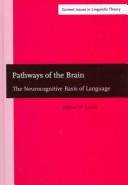
ISSN: 03040763 ISBN: 9027236771 1556198884 9027236755 1556198868 9789027236753 9789027284037 9027284032 9786613158437 6613158437 9781556198861 9781556198885 9789027236753 9789027236777 1283158434 Year: 1999 Volume: 170 Publisher: Amsterdam ; Philadelphia, PA : John Benjamins,
Abstract | Keywords | Export | Availability | Bookmark
 Loading...
Loading...Choose an application
- Reference Manager
- EndNote
- RefWorks (Direct export to RefWorks)
The brain is the organ of knowledge and organizer of our abilities, our means of recognizing a face in a crowd, of conversing about anything we experience or imagine, of forming thoughts and developing ideas, of instantly understanding words coming rapidly in conversation. How does it manage all this? Does it represent information in symbols or in the connectivity of a vast network?Pathways of the Brain builds a theory to answer such questions. Using a top-down modeling strategy, it charts relationships among words and other products of the brain's linguistic system to reveal properties
Psycholinguistics --- Neuropathology --- Biolinguistics --- Neurolinguistics --- Biolinguistique --- Neurolinguistique --- Biolinguïstiek --- Biolinguïstiek. --- Neurolinguïstiek. --- Biolinguistics. --- Biology --- Linguistics
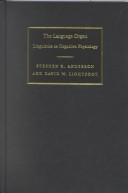
ISBN: 0521007836 0521809940 1107132142 0511178050 0511042108 0511148585 0511305419 0511613865 128041944X 0511044917 9780511042102 9780521809948 9780521007832 9780511148583 9780511044915 9780511613869 9781280419447 9786610419449 6610419442 Year: 2002 Publisher: Cambridge : Cambridge University Press,
Abstract | Keywords | Export | Availability | Bookmark
 Loading...
Loading...Choose an application
- Reference Manager
- EndNote
- RefWorks (Direct export to RefWorks)
The Language Organ treats human language as the manifestation of a faculty of the mind, a mental organ whose nature is determined by human biology and whose functional properties should be explored just as physiology explores the functional properties of physical organs. It surveys the nature of the language faculty in its various aspects: the systems of sounds, words, and syntax, the development of language in the child and historically, and what is known about its relation to the brain. It discusses the kinds of work that can be carried out in these areas that will contribute to an understanding of the human language organ. This book will appeal to students and researchers in linguistics, and is written to be accessible to colleagues in other disciplines dealing with language as well as to readers with an interest in general science and the nature of the human mind.
Biolinguistics. --- Cognition. --- Biolinguistics --- Biolinguistique --- Biolinguïstiek --- Cognitie --- Cognition --- Linguistique [Bio] --- Linguïstiek [Bio] --- Psycholinguistics --- #KVHB:Taal --- #KVHB:Linguistiek --- #KVHB:Fonetiek --- #KVHB:Taalontwikkeling --- Psychology --- Biology --- Linguistics --- Arts and Humanities --- Language & Linguistics
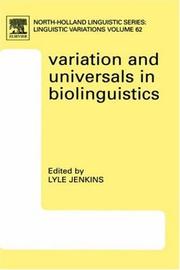
ISBN: 0444512314 9786610967193 1280967196 0080474748 9780444512314 Year: 2004 Volume: 62 Publisher: Leiden; Boston : BRILL,
Abstract | Keywords | Export | Availability | Bookmark
 Loading...
Loading...Choose an application
- Reference Manager
- EndNote
- RefWorks (Direct export to RefWorks)
"Jenkins has succeeded in putting together a terrific volume. Some of the most creative minds in the fields tackle questions of utmost importance in biolinguistics. The clarity with which these essays are written and the insights expressed in them are sure to provide solid foundations for research in linguistics and related fields for years to come. A truly outstanding collection!" - Cedric Boeckx, Harvard University, USA This book provides a current and interdisciplinary overview of work on the biology of language - what is sometimes called the "biolinguistic approach." A wide range of areas are investigated and reviewed by specialists: the micro-parametric theory of syntax, models of language acquisition and historical change, dynamical systems in language, genetics of populations, pragmatics of discourse, language neurology, genetic disorders of language, sign language, and evolution of language. It focuses on the interplay between variation and the universal properties of language. Detailed surveys or case studies are provided from the areas of syntactic variation, genetic variation, neurological variation and historical variation, among others, and of the universal principles and theoretical models that underlie the variation. Finally, it considers-in addition to the detailed empirical studies-philosophical, foundational and methodological issues in the study of the biology of language and its place within the natural sciences; e.g., innateness, modularity, language design and unification in biolinguistics, as well as critiques of the approach.
Biolinguistics --- Language and languages --- Variation --- Biolinguistique --- Biolinguïstiek --- Linguistique [Bio] --- Linguïstiek [Bio] --- Language and languages - Variation --- Biolinguistics. --- Characterology of speech --- Language diversity --- Language subsystems --- Language variation --- Linguistic diversity --- Variation in language --- Biology --- Linguistics --- Variation.
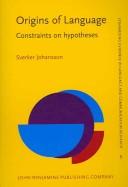
ISSN: 15667774 ISBN: 902723891X 1588116298 9781588116291 9027238936 9027294607 1423761383 9786612156885 1282156888 9781423761389 9789027238917 9789027238931 Year: 2005 Volume: 5 Publisher: Amsterdam Philadelphia : John Benjamins,
Abstract | Keywords | Export | Availability | Bookmark
 Loading...
Loading...Choose an application
- Reference Manager
- EndNote
- RefWorks (Direct export to RefWorks)
Sverker Johansson has written an unusual book on language origins, with its emphasis on empirical evidence rather than theory-building. This is a book for the student or researcher who prefers solid data and well-supported conclusions, over speculative scenarios. Much that has been written on the origins of language is characterized by hypothesizing largely unconstrained by evidence. But empirical data do exist, and the purpose of this book is to integrate and review the available evidence from all relevant disciplines, not only linguistics but also, e.g., neurology, primatology, paleoanthropology, and evolutionary biology. The evidence is then used to constrain the multitude of scenarios for language origins, demonstrating that many popular hypotheses are untenable.
Linguistics --- Biolinguistics --- Biolinguistique --- Biolinguïstiek --- Evolutie [Menselijke ] --- Evolution humaine --- Homme--Evolution --- Human evolution --- Linguistique [Bio] --- Linguïstiek [Bio] --- Mens--Evolutie --- Menselijke evolutie --- Language and languages --- Human evolution. --- Biolinguistics. --- Langage et langues --- Homme --- Origin. --- Origines --- Evolution --- Origin --- Philology & Linguistics --- Languages & Literatures --- 800 <09> --- Taalwetenschap. Taalkunde. Linguistiek--Geschiedenis van ... --- 800 <09> Taalwetenschap. Taalkunde. Linguistiek--Geschiedenis van ... --- Origin of languages --- Speech --- Evolution (Biology) --- Physical anthropology --- Evolutionary psychology --- Human beings --- Biology --- Taalwetenschap. Taalkunde. Linguistiek--Geschiedenis van .. --- Taalwetenschap. Taalkunde. Linguistiek--Geschiedenis van . --- Language and languages - Origin --- Taalwetenschap. Taalkunde. Linguistiek--Geschiedenis van --- LANGAGE ET LANGUES --- HOMME --- BIOLINGUISTIQUE --- ORIGINES --- EVOLUTION --- Langues

ISBN: 9027225915 1588112268 9027225907 158811225X 9789027225917 9786612160844 1282160842 9027296065 9789027296061 9781588112255 9781588112262 9789027225900 Year: 2002 Publisher: Amsterdam Philadelphia : J. Benjamins Pub. Co.,
Abstract | Keywords | Export | Availability | Bookmark
 Loading...
Loading...Choose an application
- Reference Manager
- EndNote
- RefWorks (Direct export to RefWorks)
Psycholinguistics --- Biolinguïstiek. --- Taal --- oorsprong. --- Biolinguistics --- Biolinguistique --- Biolinguïstiek --- Linguistique [Bio] --- Linguïstiek [Bio] --- Biolinguistics. --- LANGUAGE ARTS & DISCIPLINES --- Linguistics / General --- Linguistics --- Language --- Communication --- Information Science --- Philology & Linguistics --- Languages & Literatures --- Information Sciences --- Science, Information --- Sciences, Information --- Communication Programs --- Communications Personnel --- Misinformation --- Personal Communication --- Social Communication --- Communication Program --- Communication, Personal --- Communication, Social --- Communications, Social --- Personnel, Communications --- Program, Communication --- Programs, Communication --- Social Communications --- Dialect --- Dialects --- Languages --- Linguistic --- Biology
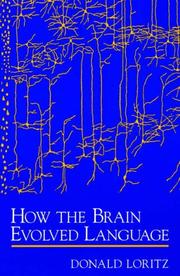
ISBN: 0195151240 019511874X 9780195118742 9780195151244 0585364699 9780585364698 9780198027966 0198027966 1280471190 9786610471195 0197721710 Year: 2023 Publisher: New York ; Oxford University Press,
Abstract | Keywords | Export | Availability | Bookmark
 Loading...
Loading...Choose an application
- Reference Manager
- EndNote
- RefWorks (Direct export to RefWorks)
How can an infinite number of sentences be generated from one human mind? How did language evolve in apes? Donald Loritz addresses these and other fundamental questions about language, cognition and the human brain.
Psycholinguistics --- Grammar --- Physiology of nerves and sense organs --- Biolinguistique --- Evolution. Phylogeny --- Biolinguistics. --- Grammar, Comparative and general. --- Human evolution. --- Language and languages --- Biolinguistics --- Grammar, Comparative and general --- Human evolution --- Brain --- Langage et langues --- Grammaire comparée et générale --- Homme --- Cerveau --- Origin --- Origines --- Evolution --- Language and languages. --- Languages & Literatures --- Philology & Linguistics --- Evolution (Biology) --- Physical anthropology --- Evolutionary psychology --- Human beings --- Comparative grammar --- Grammar, Philosophical --- Grammar, Universal --- Philosophical grammar --- Linguistics --- Philology --- Biology --- Origin of languages --- Speech --- Grammar, Comparative --- Origin. --- Evolution.
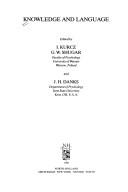
ISBN: 0444700668 9780080866932 008086693X 9780444700667 1282617826 9781282617827 9786612617829 6612617829 Year: 1986 Volume: 39 Publisher: Amsterdam North-Holland
Abstract | Keywords | Export | Availability | Bookmark
 Loading...
Loading...Choose an application
- Reference Manager
- EndNote
- RefWorks (Direct export to RefWorks)
How do people represent their knowledge about the world and use that knowledge for communication? This question is the central theme of this book. Among the aspects discussed in the first three sections are: the relationship between formal, logical descriptions of language, and psychological analyses of language use; how knowledge interacts with language use; and childrens' acquisition of language in different countries. In the last two sections, the topics discussed include the complex relationships between the development, transmission, and comprehension of intention and meaning
Cognitive psychology --- Lexicology. Semantics --- Psycholinguistics --- Language acquisition --- Cognition --- Psycholinguistique --- Langage --- Congresses --- Congrès --- Acquisition --- Psycholinguistique. --- Cognition. --- Psycholinguistics. --- Language acquisition. --- Psychology --- Acquisition of language --- Developmental linguistics --- Developmental psycholinguistics --- Language and languages --- Language development in children --- Psycholinguistics, Developmental --- Interpersonal communication in children --- Language, Psychology of --- Psychology of language --- Speech --- Linguistics --- Thought and thinking --- Connaissance --- Cinéma --- Philosophie de l'esprit --- Dieu --- Thérapie cognitive --- Théorie de la connaissance --- Psychologie cognitive --- Sciences cognitives --- Distracteurs (psychologie) --- Cognition distribuée --- Énaction --- Écriture --- Lecture --- Pensée --- Attention --- Savoir-faire --- Fonctions exécutives (neuropsychologie) --- Abstraction --- Catégorisation (psychologie) --- Cognition et culture --- Compréhension --- Conservation (psychologie) --- Dissonance cognitive --- Traitement de l'information chez l'homme --- Nombre, Idée de --- Perception --- Perception des structures --- Styles cognitifs --- Cartes cognitives --- Schèmes (psychologie) --- Métacognition --- Constructivisme (psychologie) --- Intuition --- Psychologie --- Apprentissage verbal --- Enfants --- Langue maternelle, Acquisition de la --- (linguistique) --- Langues --- Parole --- Psychologie du langage --- Biolinguistique --- Neurolinguistique --- Psychanalyse et langage --- Attitudes linguistiques --- Compétence de communication (linguistique) --- Compétence et performance (linguistique) --- Conscience linguistique --- Contrôle (linguistique) --- Créativité (linguistique) --- Différenciateur sémantique --- Discours intérieur --- Langage et émotions --- Linguistique cognitive --- Perception de la parole --- Psychophonétique --- Saillance linguistique --- Son --- Tabous linguistiques --- Tests linguistiques --- Troubles du langage --- Linguistique --- Acquisition. --- Psychological aspects --- Aspect cognitif --- Cognoscibilité --- Tests --- Langage -- Acquisition --- Apprentissage --- Aspect psychologique --- Différences entre sexes --- Aspect symbolique --- Acquisition linguistique --- Innéisme (linguistique) --- Reconnaissance des mots --- Psychologie de l'apprentissage --- Language Development --- Psycholinguistic --- Language Acquisition --- Acquisition, Language --- Development, Language --- Cognitive Function --- Cognitions --- Cognitive Functions --- Function, Cognitive --- Functions, Cognitive --- Submorphologie --- Sériation (psychologie) --- Prospection épisodique --- Traitement de l'information (psychologie) --- Amorçage syntaxique --- Acquisition du langage --- Psychologie de la lecture
| Listing 1 - 8 of 8 |
Sort by
|

 Search
Search Feedback
Feedback About
About Help
Help News
News